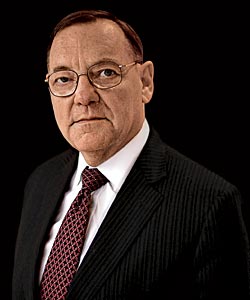Interview conducted and condensed by Jeff Bailey

You cofounded Madison Dearborn Partners, raised $18 billion to buy scores of major companies—CDW for $7.3 billion, Nuveen Investments for around $6 billion—and produced billions in profits for endowments and pension funds that invest with you. But it’s possible you’re best known as the guy who didn’t buy the Cubs. Yes.
What happened? You had wealthy local partners—Larry Levy, Rich Melman, Andy McKenna, Pat Ryan, John Rogers—yet the Ricketts family walked off with the prize. Our bid was $800 million. We were the low bidder. [Tribune Company, which owned the Cubs] wanted way too much. The financial markets collapsed. By waiting as long as they did, they might have left $200 to $300 million on the table. The Ricketts [paying $800 million] ended up right where we were. But, you know—they’re the right owner. They have a lot of patience. Major League Baseball likes family owners. They’ll be good for the team.
You’re a baseball nut. You own 12 percent of the Milwaukee Brewers and own four minor league teams, including the Albuquerque Isotopes. Weren’t you willing to pay up for the Cubs? We were probably overpaying in our original bid by $200 million.
You were a catcher on your college baseball team at Denison, right? I couldn’t hit for shit—like .210—but I was a very good defensive catcher. Between high school and college, I went to a tryout with a minor league team in the Braves system. It was clear when I got there that I’d wasted a weekend. These guys were so fast. I realized there was no way.
Sad not to be known as the owner of the Cubs? No. I didn’t enjoy—and I wouldn’t have enjoyed—the prominence. While we were identified as a bidder, all of a sudden, at this country club I belong to, people wanted to play golf with me. Valet guys put my car in front. I didn’t enjoy that.
You’re the full-time chairman of Madison Dearborn, and until late 2007 you were CEO. Did you decide which companies to buy? No. We meet every Monday morning—the top people down to the lowest associates. All decisions about transactions are made there. The team [proposing a deal] presents. The rest in the group are devil’s advocates. Concerns are raised. It really never comes to a vote.
How do you have a free-ranging discussion without pissing each other off? It took at least ten years to get to that point. You can question a deal without questioning a person’s integrity, intelligence. Everyone has an economic interest in the decision. And it’s all done in the meeting. If you don’t say it here, don’t say it in the hallway.
We’re just coming through a nasty recession caused by poor decision making. You had a front row seat—at Madison Dearborn and as chairman of the Federal Reserve Bank of Chicago for two years ending in 2009. What needs to change? The over-leveraging of financial institutions and the erosion of regulation that allowed it to occur was insane. I sure didn’t see it coming. It’ll happen again. I guarantee it. The 100-year flood can happen more often than every 100 years.
Photograph: Chicago Tribune Photo by E. Jason Wambsgans


